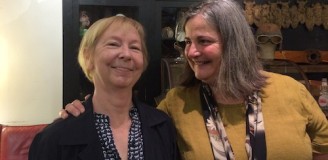VALERIE MARTIN is the author of nine novels, including Trespass, Mary Reilly, Italian Fever, and Property, three collections of short fiction, and a biography of St. Francis of Assisi, titled Salvation. She has been awarded a grant from the National Endowment for the Arts and a John Simon Guggenheim Fellowship, as well as the Kafka Prize (for Mary Reilly) and Britain’s Orange Prize (for Property). The Confessions of Edward Day was a New York Times notable book for 2007. New books include The Ghost of the Mary Celeste (Nan Talese/Random House) and a middle-grade book, Anton and Cecil: Cats at Sea, co-written with Valerie’s niece Lisa Martin. Valerie Martin has taught in writing programs at the University of Massachusetts and Sarah Lawrence College, among others. She resides in Dutchess County and is currently Professor of English at Mt. Holyoke College.
“Narrative Voices” 9/11/14 – The Exercises
The second Word Café was a literary treat. Acclaimed novelist Valerie Martin read several selections from her brilliant novel-in-many-voices, The Ghost of the Mary Celeste. She read a passage narrated by a skeptical woman journalist interviewing a celebrated spiritualist who surprises her with details of her mother’s death, and another about the young Arthur Conan Doyle during his stint as a ship’s doctor in Africa.
We talked about how writers make the decision to use first or third person. Valerie observed that first person narration creates the sense of a story told in a spoken voice, and is especially effective when the narrator is trying to justify his or her behavior (“First person is driven by guilt.”) It bonds the reader to the speaker’s version of events and other characters, whether accurate or not.
Third person works well for broader-canvas stories. Nina likened the omniscient third-person narrator to a movie camera, which can provide a long-shot overview, then move close in on one character in the scene, then another, then cut to an entirely different time and place.
After some questions about different narrative strategies, we passed out two writing exercises for people to try in class or at home:
EXERCISES: 500-1000 WORDS
CHARACTER (Valerie Martin):
Consider a friend or family member you know well. Answer the following questions about him/her: What is her ambition? What is her idea of fun? What does she value? Who or what is she conflicted about? What inhibits her? What, in your view, are the strengths and weaknesses of her character? What do you know about her that she probably doesn’t know about herself?
NARRATIVE VOICE (Valerie Martin & Nina Shengold):
Choose any object in this room. Writing in first person, in the voice of its previous owner, explain where it came from and how it got here.
Once again, it was amazing to hear what people wrote and read after just a few minutes of concentrated time. Writing is usually a solitary pursuit, but there must be something special in the collective energy of many writers working in the same space.
Next week’s guest is poet Mark Wunderlich, talking about rhythm and image. Join us!


